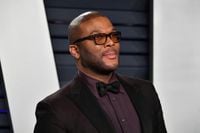Tyler Perry, the American entertainment mogul known for his iconic Madea character and a net worth estimated at $1.4 billion by Forbes, has recently opened up about his strict financial boundaries with family members. In a candid discussion on Kirk Franklin’s YouTube series, Den of Kings, Perry laid bare his philosophy of "tough love, not welfare," revealing how he balances generosity with accountability within his own family.
During the conversation with Franklin, rapper Jeezy, and entrepreneur Derrick Hayes, Perry recounted a particularly telling episode involving his aunt. She had frequently called him asking for money, which he initially provided. However, Perry wanted to help her build sustainable financial independence rather than perpetuate dependency. To that end, he offered her a job within his business.
"I fired my aunt," Perry said matter-of-factly, recalling how she failed to take the opportunity seriously. "She said she wanted a job. She would always call asking for money, I would send her the money. I said, ‘Listen, I want to help you. I want to help you build this thing, not be welfare to you. So, let me give you a job.’" Unfortunately, she often skipped work and called in frequently, prompting Perry to make the tough decision to terminate her employment.
"Well, you gotta go," he explained. "Because you want me to hand you the money, but you don’t want to work for it. See, that doesn’t work for me." This story resonated with the other guests at the table, with Jeezy agreeing, "I feel him." Perry’s stance extends beyond adults in his family; he applies the same principle to his 10-year-old son, Aman. The media executive insists that his son must complete chores to earn certain things, emphasizing that giving handouts can be more harmful than helpful.
"I don’t believe in giving us things that are just going to handicap us," Perry said. "That is the worst thing you can do." This philosophy reflects a broader approach to family finances that Perry adopted after the death of his mother in 2009. She had previously asked him to support certain family members, but Perry decided to draw a firm line.
"When she passed away, I sent all of them letters, saying, ‘Listen, you got 60 days to become gainfully employed because I’m not gonna keep supporting you like this,’" Perry recalled. Remarkably, he noted that all the family members complied and found jobs, even if those jobs didn’t pay much. "It was something else for them to do to feel some pride in. It’s the same thing I would want somebody to do for me." This move was not without its critics within the family. Perry revealed that one relative was upset when he refused a $1 million request.
"I have a family member who got mad at me because I wouldn’t give them $1 million," Perry shared. This candid admission highlights the tension that often accompanies wealth within families, especially when boundaries are set. Perry offered advice to Derrick Hayes, who was navigating similar family pressures while building his own business empire.
"If you’re trying to build a business to carry everyone in your family through, that’s one thing. And if you’re trying to do that, then build a business," Perry said. He used a vivid metaphor to describe the challenge of balancing family loyalty with business acumen: "You gotta watch the family members that come putting holes in the boat that you’re trying to get across the sea. Sometimes you build a boat by yourself. ‘Y’all wait over here on the shore. Stay here. I’m building this boat. I’m gonna go over and build this, and then I’m gonna come back and see who’s worthy to come.’ Because anybody who’s gonna drag you down or put holes in the boat, or try to destroy you, why bring them over?"
This frank discussion about family, finances, and responsibility comes amid a turbulent period for Perry. In June 2025, actor Derek Dixon filed a $260 million lawsuit against Perry, alleging sexual harassment, assault, and professional retaliation on the set of Perry’s BET political drama The Oval. Perry’s lawyer has strongly denied these allegations, calling them a "scam" and "fabricated." Perry himself has not publicly commented on the lawsuit.
Despite these challenges, Perry’s approach to mixing family and business remains firm and consistent. His stories about firing his aunt and setting clear expectations for family members underscore a belief in empowering people through work rather than enabling dependency. Perry’s willingness to share these personal experiences publicly adds a nuanced perspective to conversations about wealth, family obligations, and personal boundaries.
For a man whose career has spanned acting, writing, producing, and directing — and whose creations have deeply impacted American culture — Perry’s financial philosophy offers a window into the discipline behind his success. It’s a reminder that even those with immense resources face difficult decisions when it comes to balancing generosity with accountability, especially with loved ones.
In a world where stories of celebrity generosity often dominate headlines, Perry’s narrative stands out for its emphasis on self-reliance and dignity. His insistence that family members earn their keep and take pride in their work challenges the notion that wealth should automatically translate into endless support. Instead, Perry advocates for a model where help is a stepping stone to independence, not a permanent crutch.
As Perry continues to build his legacy in entertainment and beyond, his approach to family finances may offer lessons for others navigating similar dynamics. It’s a story about tough love, clear boundaries, and the sometimes uncomfortable truth that helping someone truly means encouraging them to stand on their own two feet.


